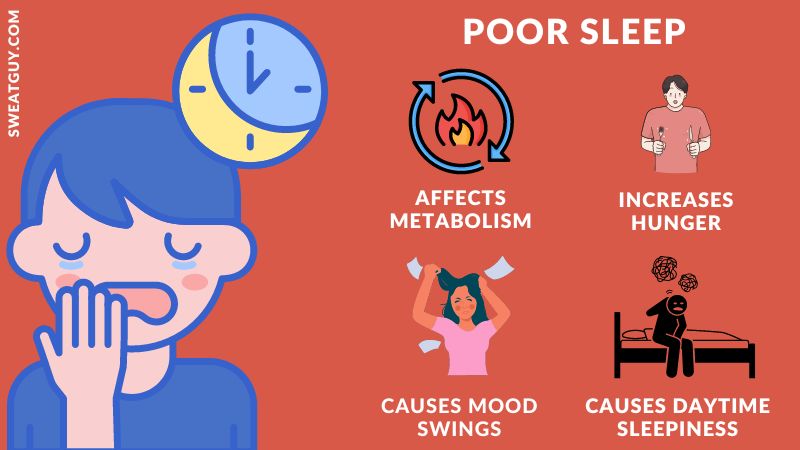Are you gaining weight even after following a healthy diet and workout program?
Then, it’s time to get your sleep right.
Apart from diet and workouts, your sleep cycle plays a determining role in slimming.
Whether sleeping less or oversleeping, both can affect your biological functions in different ways. It can hinder your metabolism, appetite, as well as energy levels.
Particularly, oversleeping seems to increase fat accumulation. Various researchers have tried to find out how does sleeping more increase weight.
This blog focuses on digging out the actual link between oversleeping and the possibility of weight gain. We will begin by exploring the association between them.
Does Oversleeping Increase Weight?

Oversleeping has real adverse effects on well-being. It can lead to many issues related to body weight composition.
Not to mention, oversleeping increases the risk of obesity while stimulating fat accumulation in the body.
In short, sleeping more than required can lead to many unwanted health problems.
This includes issues like failing to remember small things, depression, mood, anxiety, body ache, inflammation, and increased risks of cardiac problems.
In short, too much sleep can lead to multiple health problems. Some studies directly address the relationship between oversleeping and weight gain.
Study: The Link between Sleep Duration and Weight Gain in Adults
The study aimed to find the link between sleep duration and succeeding fat and weight gain. The six-year longitudinal study on two hundred seventy-six adults (age group: 21-64) related the two variables.
Researchers found both short-duration and long-duration sleep predicts an increment in fat gain and weight gain in adults.
People sleeping for more than 9 hours per night had increased body weight over others who slept for a normal duration. Such people were 21% more likely to become obese than normal sleepers.
The study puts forth a clear picture of how sleep duration can increase body weight.
In fact, oversleeping isn’t the only hindering factor to healthy body weight composition. Even short sleep duration can have a similar impact. This research paper indicated this aspect as well.
In the long run, sleeping for a long duration for any reason is harmful. Usually, folks do this to induce weight loss by avoiding food consumption, but it triggers contradictory biological processes.
This leads to unprecedented weight gain.
That’s not it! There’s more to the relation between sleep schedule and weight.
How Does Sleep Affect Weight?

Sleep provides complete rest to your body to maintain well-being and a healthy body weight composition.
The key is to get adequate high-quality sleep for complete rest. Poor sleep can affect different body functions, impacting your body weight.
Moreover, inadequate or poor quality sleep degrades the current metabolic rate of the body. This ends up affecting the transformation of calories into energy.
Right below is a thorough explanation of how sleep can make or break your weight loss game.
#1. Poor Sleep Affects Metabolism
A study published in the Journal of Clinical Endocrinology & Metabolism tried to illustrate the impact of sleep restriction on metabolism. Random acute sleep is inevitable.
However, chronic sleep restriction may have an impact on the recovery of metabolic outcomes.
#2. Insufficient Sleep Leads to Increase in Cortisol
Inadequate and poor quality sleep increases the secretion of insulin and cortisol.
The higher presence of some hormones induces fat accumulation. Particularly, the production of cortisol and insulin increases body fat.
#3. Sleep can Affect Appetite
Low-quality sleep is likely to elevate your appetite. Whether insufficient sleep or poor sleep, your sleep cycle affects appetite-regulating hormone production and secretion.
Short-duration sleep increases the secretion of ghrelin hormone resulting in elevated hunger, while leptin, the hormone responsible for fullness decreases. This havoc in the secretion of different hormones hinders your appetite.
#4. Oversleeping Has Its Implications
Excessive sleeping around meal times can lead to calorie deprivation. This would deprive the body of the necessary fuel to execute some of the bodily functions.
It can even impact the physical processes important to maintaining a healthy body.
On top of that, deliberate oversleeping can interfere with the natural body clock and biorhythm. They can go off course, causing lots of problems.
Indeed, biorhythms regulate every body function. This includes metabolism, cognitive function, mood, appetite, and even the immune system.
So, to have a healthy body and fitness-infused life, a hale and hearty sleep routine is necessary for adults. It is required for keeping the biorhythms at the proper pace.
At the same time, it is important for maintaining healthy body composition.
Sleep can affect metabolism, fat accumulation, and other related processes.
To conclude, sleeping the whole day and night does increase weight. So, it is vital to know the right duration for nap time. For this, knowing how much sleep is considered oversleeping is crucial.
How Much Sleep is Too Much?
Sleep requirements vary from individual to individual. In general, children require more time to sleep compared to adults.
For adults, the normally recommended sleep duration is 7 to 9 hours every night.
Sleeping more than 8 to 9 hours every night can be counted as oversleeping.
This is a general timeline categorized as oversleeping.
Moreover, noticing some oversleeping symptoms can help to know the cause. This includes:
- problems with sluggishness,
- difficulty waking up,
- daytime naps,
- reduced appetite, and
- falling asleep all the time.
Hence, if your sleep duration is longer along with these problems, the sleep duration may be more than required.
We can infer from the above discussion that oversleeping does increase weight. However, the right sleep duration supports your slimming goals. Having the right sleep cycle and habits always help.
How Many Hours Should I Sleep To Lose Weight?
For folks trying to lose weight, extra attention should be given to sleep habits. It can boost your weight loss efforts.
Follow these recommendations to lose weight with sleep:
- Aim to sleep at least 7–9 hours each night.
- Try to get in bed at the same time daily as well as wake up at the same time.
- Maintain good sleep hygiene to get high-quality sleep.
In some cases, adequate sleep led to a reduction in appetite. Whereas, some studies observed a reduction in daily calorie consumption by 270 calories. Subjects even showed a lesser calorie intake of 500 calories daily.
Clearly, proper sleep should have an influential role in a weight loss regimen.
You also need to avoid some sleep habits that tend to cause weight gain as these often go unnoticed. The next section addresses such sleep routines that unknowingly contribute to weight gain.
10 Sleep Habits That Cause Weight Gain

Oversleeping does cause weight gain, but other sleep habits can do the same.
It isn’t just about sleep, but also about what you do before hitting the sack. Also, the lighting of the rooms matters as well.
Let’s discuss the major sleep habits that can cause weight gain…
#1. Sleeping on Stomach
Among all sleep postures, sleeping on the stomach is the worst. Though it is great for people with sleep apnea or snoring problems, it is not good for folks in general.
This sleep position can lead to back ache and neck pain. It can even trigger weight gain in the long run.
On top of that, sleeping on the stomach puts unwanted pressure on the muscles and joints. After waking up, you may feel tired and your body may ache.
#2. Lights on During Sleep
Lights in the bedroom seem to play a key role in determining your sleep quality. A study by “The American Journal of Epidemiology” addressed the problem.
Exposure to minimum light can hinder the rest provided by quality sleep. On top of that, it can accelerate the secretion of cortisol. The stress hormone gets at its peak due to light exposure.
#3. Warm Bedroom
The human body naturally tends to reduce the temperature during the rest period.
It helps repair your bones, muscles, and nails. On top of that, it secretes many fat-burning hormones. Conversely, a warm bedroom can affect this process resulting in weight gain.
#4. Sleeping in Clothes
Don’t wear tight-fitting clothes to your bed, particularly avoid wearing innerwear when hitting the sack. Wearing such clothes can increase body temperature, which reduces the release of melatonin.
Melatonin is a sleep hormone, which regulates the body clock to determine sleep quality while ensuring you fall asleep.
#5. Staying Up Too Late
Staying up late to complete just another task does no good in the long run. Even oversleeping till late morning hours has no benefit and may increase weight.
However, people who usually wake up late at night don’t get enough sleep.
They tend to sleep at 2 in the morning and wake up around 8 or 9 to get ready for the office. It is definitely an insufficient sleep duration while it affects melatonin secretion. Also, waking up till late at night induces snacking habits leading to further problems.
#6. Insufficient Sleep
The bedtime routine is crucial for adults. It determines sleep quality as well as the rest provided by sleep. In general, one should aim to sleep at least 7 to 9 hours daily.
Short sleep durations or inadequate sleep tend to elevate the secretion of cortisol and the hunger hormone, ghrelin.
Moreover, it lessens HGH, leptin, and serotonin secretion. This can lead to an elevated risk of weight gain.
#7. Late Night Workouts
Regular workouts improve your fitness level. It even helps reduce body fat accumulation while benefiting overall health.
However, late-night workouts are unrealistic in the long run because it affects the quality of sleep.
Workouts like cardio and HIIT can elevate your body temperature and decimate the secretion of important sleep hormones. Moreover, it keeps your body and mind active for a long time, making it tougher to fall asleep.
#8. Eating before Hitting the Bed
This is the worst sleep habit that is a surety for unprecedented weight gain. Late-night meals and snacking increase your daily calorie intake. It even keeps your digestive process running while sleeping.
This hinders the other body processes responsible for repairing tasks. Your body shifts the focus to handle the consumed food.
Moreover, this sleeping habit even affects the cool-down process causing further problems.
#9. Drinking Coffee Just before Bedtime
Caffeine is not good for your sleep. It can provide a refreshing sensation when taken in the morning, but night-time coffee intake can disturb your sleep.
It can even change the secretion of appetite-regulating hormones and fullness hormones. Also, a high daily caffeine intake intervenes in sleep.
#10. Don’t Eat a Heavy Dinner
Your dinner should be the lightest meal of the day. However, folks tend to have a light breakfast and heavy dinner, when the contrary is true.
Having a large meal before bed puts your digestive system to work.
It can elevate your body temperature and it may take time to cool down. Thus, one may find it tough to sleep after having a large meal.
These are just some of the most common bad sleeping habits that cause weight gain. Try to change them accordingly to get quality sleep.
Focus on sleeping for at least 7 to 8 hours daily to wake up fresh. A restful night’s sleep is key to a healthy life and fast weight loss.
Plus, try to avoid oversleeping because it does increase weight. Interestingly, lack of sleep can also have similar implications. It can cause weight gain and make it difficult to lose body fat.
The Final Words
Occasional oversleeping isn’t bad at all. However, when it transforms into a habit, it can lead to weight gain.
Various studies and research papers have addressed the problem.
Evidence suggests the duration of sleep directly impacts the body’s processes. It can affect metabolism, fat accumulation, appetite, and energy level.
Eventually, sleeping too much does cause the body weight to increase, making fat loss much tougher.
So, the key is to sleep for normal hours, i.e. 7 to 8 hours each night, to induce weight loss. Also, the quality of sleep is crucial to get benefits.
Try to avoid the above-mentioned bad sleeping habits that trigger different weight gain processes, and you’re good to go.
Do you have any more tips that you use before bed to have proper sleep and maintain weight? Please share them in the comments section and help out your fellow readers.
READ NEXT: 15 Ways to Burn Fat While You Sleep